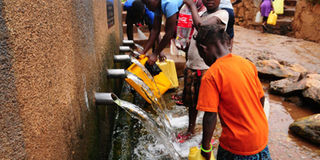Access to safe water is critical

Given the rapid industralisation, water sources are becoming endangered as is the environment since this contributes to water supply. FILE PHOTO
What you need to know:
The issue: Water access
Our view: Unless the population is sensitised to appreciate the benefits of protecting the environment, Ugandans will continue to suffer harm associated with unsafe water.
As the world celebrated Water Day yesterday, pictures of residents fetching water in swamps or lakes that doubled as drinking spots for livestock, were published in this newspaper.
Eight million people in Uganda do not have access to safe water, according to the 2015/16 report released by Water Aid, an international organisation. It further revealed that 45,000 children under five years die due to diarrhoea as a result of poor water and sanitation.
When President Museveni launched the Uganda Vision 2040 in 2013, he highlighted that the government’s target is that every Ugandan should access clean and safe water by 2040. However, while there is still time, the progress is rather slow.
Many Ugandans, especially in rural areas, still have to walk long distances to access water, share water sources with animals or generally do not have safe water.
Given the rapid industralisation, water sources are becoming endangered as is the environment since this contributes to water supply. State minister for Environment Dr Mary Goretti Kitutu has highlighted before that the country’s water resources are decreasing.
The country requires 55 billion cubic metres, but it is projected to have only 37 billion cubic metres by 2020. The decline has been attributed to different forms of environmental degradation. It is critical to create awareness in the masses on how to protect the environment.
This year’s theme: ‘Nature for Water’, looks at natural water as a solution to water challenges. Prosecuting the people who destroy wetlands has been ongoing and must continue.
However, this must be intensified. The big ‘fish’ especially must be brought to book. Unless the population is sensitised to appreciate the benefits of protecting the environment, Ugandans will continue to suffer harm associated with unsafe water.
The government in partnership with Africa Development Bank recently launched a Shs36 billion scheme in Manafwa District, which will provide 1,296 cubic meters of treated water per day for more than 500 households. Such projects must be spread across the country.
Most importantly, stringent measures to ensure that the project meets its objectives and that there is accountability. This is a matter local governments should put on their priority list and for which residents must put their local leaders to task to ensure it is achieved.




